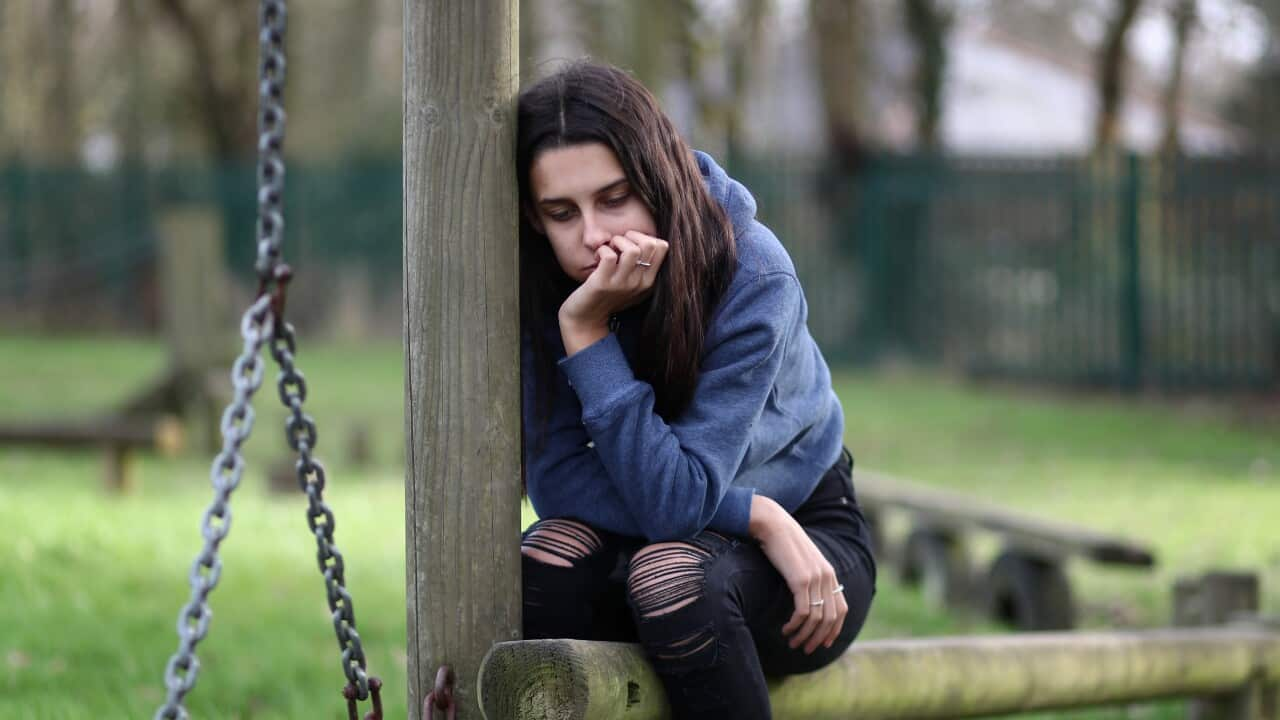Key Points
- A new report shows loneliness is on the rise among young Australians, particularly young females.
- According to the report, 25 per cent of females aged 15-24 said they often felt very lonely.
- Experts say loneliness can also impact physical and mental health outcomes.
Young Australians are more connected than ever before, but loneliness and feelings of social isolation are on the rise.
A new report from the federal government's Australian Institute of Health and Welfare (AIHW) has found an increasing number of people aged 15–24, especially young females, have reported experiencing loneliness.
Dr Kate Filia, senior research fellow at youth mental health organisation Orygen, said her research has also indicated loneliness is increasing among young people in Australia.
"We've found in our most recent dataset that almost a quarter of young people in Australia today are saying that they feel lonely most of the time," she said.
"That is a fair chunk of people saying loneliness is something they feel the majority of the time, that is huge."
Is loneliness on the rise in young people?
According to the AIHW report, in April 2020, during the nationwide COVID-19 lockdown, 46 per cent of respondents reported feeling lonely at least some of the time in the past week.
Loneliness has declined slightly, but two years later, 36 per cent - more than one-third - of Australian adults said they experienced loneliness at least sometime during the week.

More people aged 15–24 now report feeling lonely than people aged 55 and over, with young females most likely to experience loneliness. Source: SBS News
While loneliness in other demographics appears to be steady or reducing, this group remains elevated.
Ashley De Silva, CEO of Reachout - an organisation that offers mental health support services - said loneliness is an issue people are regularly seeking support for.
"We have also recently done some research in this space, which is showing more than half of young people in Australia are worried or concerned about the degree to which they feel lonely," De Silva said.
"And of that group, 82 per cent were recognising it is having a major or moderate impact on their mental health."
Why do so many young Australians feel lonely?
There is not one clear cause for rising loneliness.
Researchers have identified some positive impacts of how social media can help people feel socially connected, but it can also exacerbate feelings of loneliness.
Filia says social media can often impact self-esteem, particularly for young people who may be susceptible to comparing themselves to others.
“It does create a sense of sitting there watching the world go by and seeing all these amazing wonderful things happening around them, because as we know that is what social media portrays,” she said.
Throughout the pandemic, young people reported the highest levels of loneliness, which Filia says continue to linger.
“The feelings of isolation caused by the pandemic also seem to have been exacerbated and the effects do continue, especially with loneliness.”
“The pandemic did have a lot to do with the increased feelings of loneliness, because young people were more isolated to just their family units and not able to form those connections with other people outside of their home, which is so important.”
How does loneliness impact health?
Filia said loneliness is closely linked with mental health conditions like depression and anxiety, and described the relationship as "circular."
"(Loneliness) can lead to those feelings of mental ill-health, but it can also be exacerbated by those things too, so it is kind of a circular relationship," she said.
Filia said poor mental health can, in turn, impact physical health.
She said those struggling with mental health issues or low self-worth often struggle to exercise, spend time outside, or sleep well.
"Loneliness can lead to poor mental health, it can lead to difficulties with looking after yourself physically, it can contribute to all of those things."
"It can become a really damaging issue once it gets started, which is why we need to address it as soon as we can."
How can we reduce loneliness?
Loneliness is a feeling Kushagra Singh Rathore can relate to.
The 21-year-old has experienced two extended periods of loneliness, first when he was a teenager and his family relocated to Perth after moving between Adelaide, Sydney and India.

Kushagra Singh Rathore thinks the feeling of loneliness is common and most people tend to disregard it. Credit: Supplied
"I think loneliness is a really common feeling, and I think most people tend to disregard it and don't want to admit they're lonely," he said.
"As a young person, loneliness comes in a lot of different shapes and sizes but it is quite prevalent."
Over the years, Rathore has found exercising, spending time with his dog, getting outside, reading and doing volunteer work all helped improve his mental health and relationships.
"It started to help, and when I started developing better connections and stronger friendships, that was a big help, knowing I would always have someone there."
De Silva said he would encourage young people to give themselves time to try out different ways of meeting people and developing meaningful connections.
"I think the other thing that's really important is that we do help young people feel that it is appropriate to talk about feelings of loneliness that they're having," he said.
"Without action, it could be having unnecessary and prolonged impacts on your mental health and wellbeing ... it is absolutely [worthwhile] to seek support."












